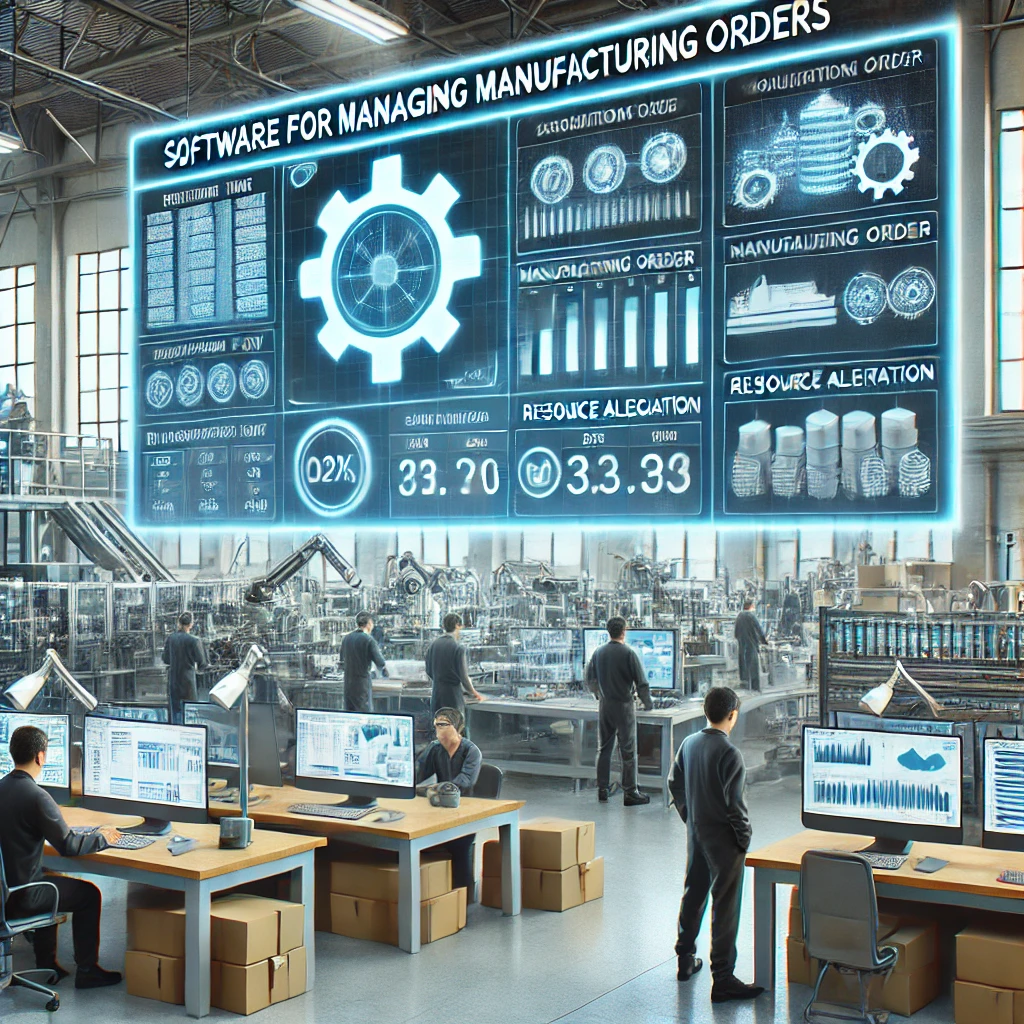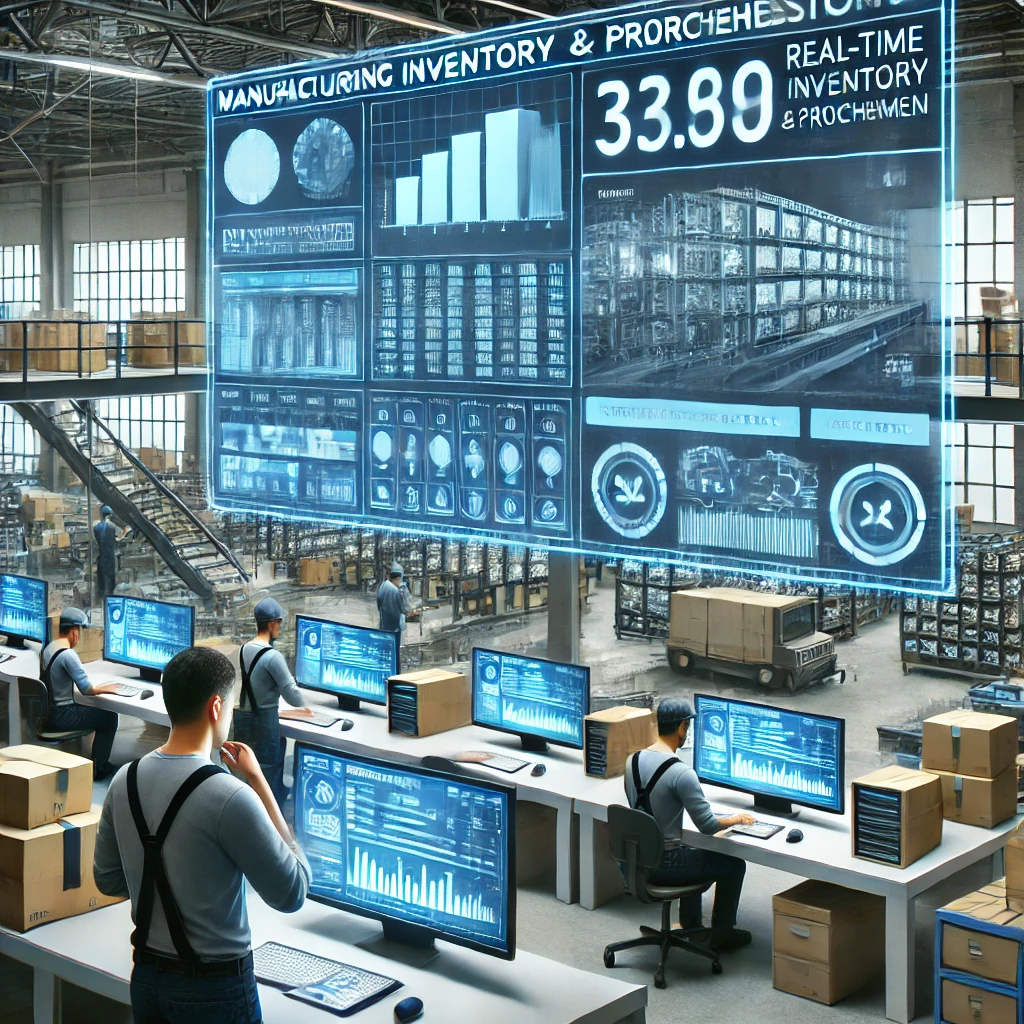In the fast-paced world of manufacturing, tracking work orders accurately and efficiently is key to maintaining smooth production processes. ERP with work order tracking offers manufacturers the ability to automate, manage, and monitor work orders in real time, ensuring that resources are used effectively, and production goals are met on time. By integrating work order tracking into an ERP system, manufacturers gain complete visibility into their operations, helping them make informed decisions, reduce downtime, and optimize workflows.
In this article, we’ll explore how ERP with work order tracking can transform manufacturing processes, improve efficiency, and drive growth.

What is ERP with Work Order Tracking?
An Enterprise Resource Planning (ERP) system is a comprehensive software solution that integrates various business functions, such as production planning, inventory management, financial tracking, and customer relationship management, into one unified platform. When combined with work order tracking, ERP systems provide real-time visibility into the status of work orders, ensuring that production is running efficiently, and that resources are used effectively.
ERP with work order tracking helps manufacturers:
- Monitor work orders in real time, from creation to completion.
- Track resource allocation such as labor, machinery, and materials.
- Optimize production schedules to ensure that deadlines are met.
- Identify potential delays and bottlenecks before they disrupt production.
How ERP with Work Order Tracking Works
The work order tracking feature in an ERP system allows manufacturers to create, prioritize, and monitor work orders as they progress through the production cycle. Here’s how it works:
1. Work Order Creation
Work orders are created within the ERP system, detailing the necessary steps for completing a specific production job. This includes material requirements, labor allocation, machine usage, and quality control steps.
2. Resource Allocation
The ERP system allocates the necessary resources—such as labor, machinery, and materials—based on the work order requirements. This ensures that resources are available when needed and prevents production delays.
3. Real-time Monitoring
As work orders progress through the production process, the ERP system tracks their status in real time. Manufacturers can monitor progress, identify potential delays, and make adjustments as needed to keep production on schedule.
4. Automated Alerts
If issues such as machine breakdowns, material shortages, or labor shortages arise, the ERP system sends automated alerts to notify managers. This allows them to take corrective action quickly and prevent downtime.
5. Work Order Completion
Once a work order is completed, the ERP system records the actual material usage, labor hours, and machine time. This data is used for performance analysis and future production planning.
Benefits of ERP with Work Order Tracking
Implementing ERP with work order tracking offers several benefits that can improve production efficiency and reduce costs:
1. Improved Efficiency
By automating work order tracking and providing real-time data, ERP systems help manufacturers reduce manual errors, optimize resource allocation, and improve overall efficiency. This leads to faster production times and lower operational costs.
2. Reduced Downtime
With real-time tracking and automated alerts, manufacturers can identify potential delays or bottlenecks before they cause significant disruptions. This helps minimize downtime and keeps production running smoothly.
3. Better Resource Management
ERP systems track the availability and usage of materials, labor, and machinery, helping manufacturers allocate resources more effectively. This reduces waste and ensures that production jobs are completed on time.
4. Enhanced Production Planning
By providing real-time insights into work order status, ERP systems help manufacturers create more accurate production schedules. This ensures that resources are used efficiently and that production goals are met.
5. Improved Quality Control
ERP systems integrate quality control into the work order process, ensuring that products meet quality standards at every stage of production. This reduces defects and ensures that customers receive high-quality products.
How Syncratech’s ERP with Work Order Tracking Can Help Your Business
At Syncratech, we offer customized ERP solutions with work order tracking designed to help manufacturers streamline their production processes, optimize resource usage, and improve efficiency.
Here’s how our solution can benefit your business:
- Real-time work order tracking to monitor progress and prevent delays.
- Automated resource allocation to ensure that labor, materials, and machinery are used effectively.
- Integrated quality control to ensure that products meet quality standards.
- Detailed reporting tools to track performance and identify areas for improvement.
- Seamless integration with other systems, such as inventory management and production planning.
By implementing Syncratech’s ERP with work order tracking, manufacturers can improve efficiency, reduce costs, and ensure that production runs smoothly. Visit our homepage to learn more.
FAQs About ERP with Work Order Tracking
1. How does ERP with work order tracking improve production efficiency?
ERP systems automate work order tracking, providing real-time data on the status of each job. This helps manufacturers optimize resource allocation, reduce downtime, and improve overall production efficiency.
2. Can ERP systems with work order tracking integrate with other systems?
Yes, ERP systems with work order tracking integrate with other systems, such as inventory management, financial tracking, and quality control, providing manufacturers with a unified view of their operations.
3. How does work order tracking help prevent production delays?
Work order tracking provides real-time visibility into the progress of each job. If issues such as material shortages or machine breakdowns occur, the ERP system sends automated alerts to notify managers, allowing them to resolve problems before they cause delays.
4. What are the key benefits of using ERP with work order tracking?
The key benefits of using ERP with work order tracking include improved efficiency, reduced downtime, better resource management, enhanced production planning, and improved quality control.
Final Thoughts
For manufacturers looking to streamline their production processes and improve efficiency, ERP with work order tracking is an essential tool. By providing real-time visibility into work order status, resource usage, and production progress, ERP systems help manufacturers optimize their operations and reduce costs.
At Syncratech, we offer tailored ERP solutions designed to help manufacturers monitor work orders, improve efficiency, and ensure that production goals are met. To learn more about how our ERP can benefit your business, visit our homepage today.



